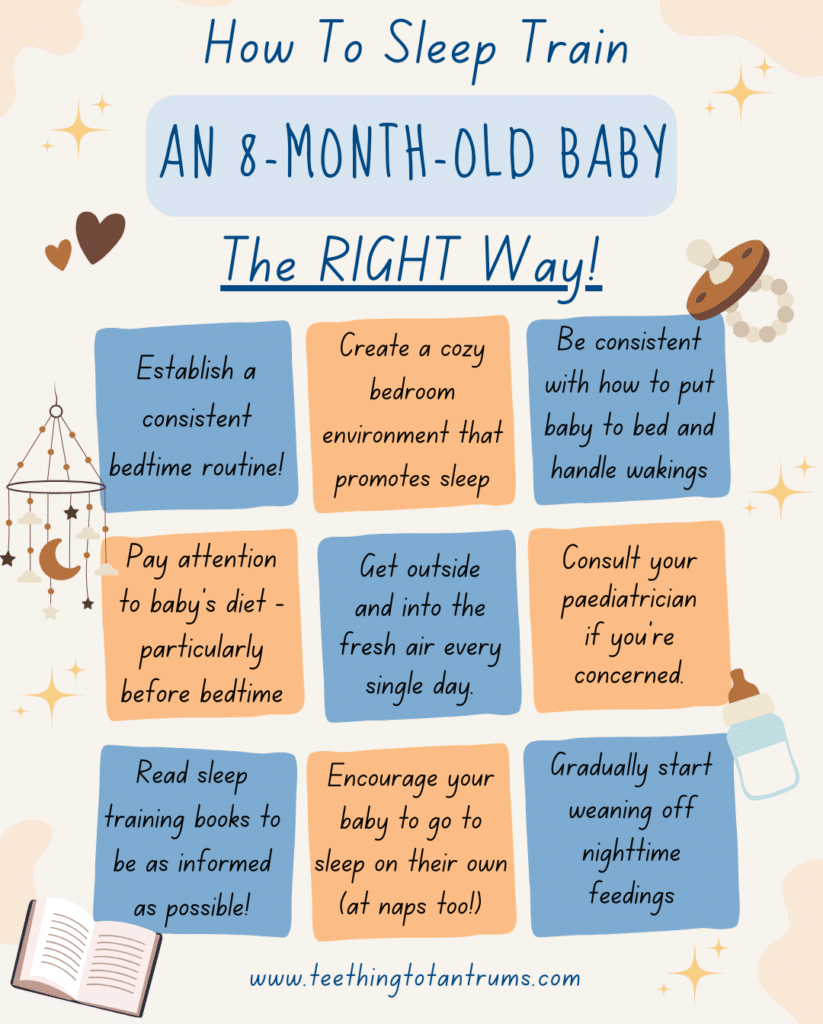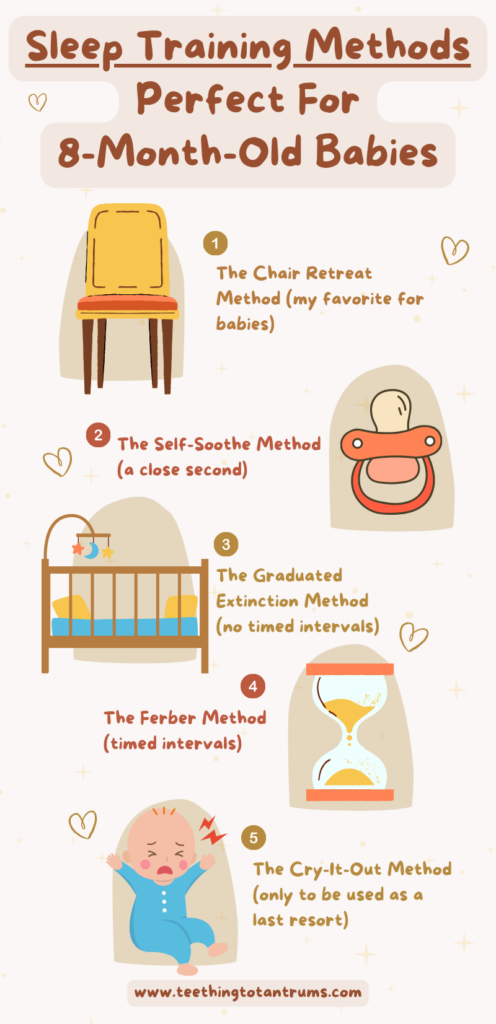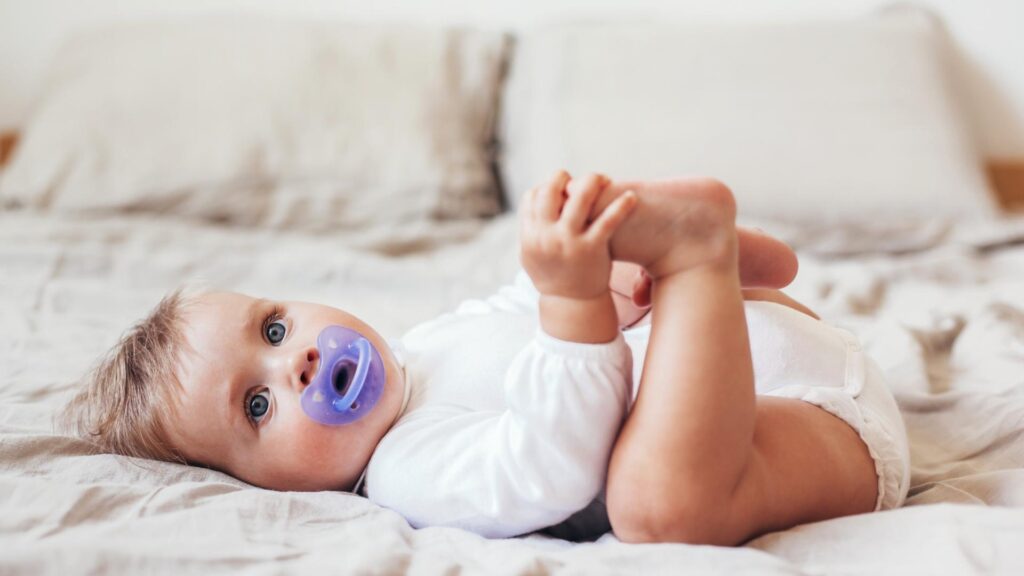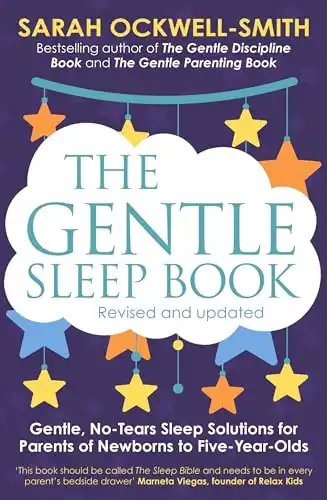Is your 8-month-old still waking multiple times a night, only sleeping when held, refusing to nap, and leaving you exhausted and desperate for a full night’s sleep? You’re not alone.
As well as establishing healthy sleep habits, sleep training an 8-month-old is one of the best ways to help your baby (and you) get the sleep you need.
In this guide, I will share with you over 40 years of childcare experience to help your baby learn to self-soothe and sleep for extended stretches. Keep reading to find out how to approach sleep training 8-month-old babies in a way that works perfectly for your family.

Table of Contents
Key Takeaways
- Sleep training is the art of teaching your baby to fall asleep independently and through the night by developing healthy sleep habits and breaking negative associations. It’s typically recommended for babies over the age of 6 months as they start to develop self-soothing abilities.
- Several gentle sleep training methods are suitable for 8-month-old babies like the self-soothe technique, chair method, and fading sleep technique. The goal is to help baby learn to fall asleep on their own without much crying. The cry-it-out method is more intense and may not suit all families.
- To help sleep training go smoothly, establish a consistent routine, have an age-appropriate sleep schedule, create a sleep-friendly environment, and watch for and act on sleep cues promptly.
The Importance Of Sleep Training
As your baby grows… various factors can disrupt their sleep schedule.
Whether it’s developmental changes, a parent returning to work, moving house, or moving into their own room…
These disruptions can have a profound impact on your 8-month-old’s sleep.
And if their sleep habits were questionable before… then your baby will certainly need some help to get their sleep back on track.
That’s where sleep training comes in.
Sleep training is a way of teaching your child to fall asleep and cope with waking at night and falling back to sleep without your presence.
In other words, it helps your little one to learn to soothe themselves and sleep through the night.
But why exactly is it important?
Firstly, consistent sleep patterns are essential for cognitive and physical growth. At 8 months, your child is gaining new skills like crawling, clapping, and sitting unassisted. Quality sleep will support this rapid development.
Secondly, establishing good sleep habits early on can prevent long-term sleep issues. It sets a healthy foundation for your child’s future sleep into adulthood.
Remember, you’re not just teaching sleep; you’re teaching self-soothing skills.
Finally, it’s important for your well-being too. When your baby sleeps better, so does the parent. With more rest, you’re able to be a more patient and attentive parent. This benefits your whole family’s overall happiness and health.
So how can you sleep train an 8-month-old quickly and effectively?
How To Sleep Train An 8-Month-Old: Preparation
Sleep training at 8 months starts by establishing healthy sleep habits.
Particularly as night wakings are a typical challenge at this age and effective sleep strategies can help your baby sleep for longer periods at night, nap well, and effectively self-settle when they wake.
If you can maintain these sleep habits, you may find you never have to use conventional sleep training methods.
And even if you do, these healthy habits will ensure your sleep training efforts have a higher chance of success.

- Establish a bedtime routine. First and foremost (and this is something I am always emphasizing) creating a consistent bedtime routine is essential for your baby. Start with calming activities an hour before bed. Follow this with a bath, maybe a baby massage, reading a bedtime book, feeding, and then bed. Consistency is key to setting your baby’s sleep-wake cycle, making it easier for them to know when it’s time to sleep.
- Ensure the environment in your baby’s room promotes sleep. Consider using a nightlight or white noise machine to provide comfort and to help the room feel cozy. Soft sheets and comfortable sleepwear will also help your little one feel relaxed and snuggly.
- Be consistent. Consistency is key to setting your baby’s sleep-wake cycle, making it easier for them to know when it’s time to sleep. Stick to the same routine at the same time every night and avoid making exceptions, even on weekends. It is very important to keep bedtimes and naps on schedule and at the same times daily.
- Pay attention to diet: Avoid sugary or caffeinated food and drinks in the evening and make sure they have plenty to eat during the day so that hunger is not the cause of nighttime waking. 8 month olds need between 750 and 900 calories each day, of which about 400 to 500 should come from breast milk or formula.
- Get outside every day: Exposure to natural daylight will help balance your little one’s circadian rhythm and melatonin production, making it easier for them to fall asleep at night.
- Consult with your pediatrician. I would also advise talking to your pediatrician if you have concerns about your baby’s sleep habits. They can offer customized advice to tailor fit your particular family setup and allay any fears you might have about whether sleep training is the right course of action.
- Read some baby sleep training books. There are many sleep training methods to choose from and you must choose one that you feel comfortable with. A lot will depend on what sort of issues you are having and there is a lot you can do before embarking on conventional sleep training methods that may help your little one to successfully fall asleep alone and resettle themselves at night.
- Try to encourage your 8-month-old to fall asleep on their own. Put your down when drowsy and not fast asleep. If baby stirs or wakes in the night, wait a few moments before intervening. This gives them a chance to self-soothe. If crying persists, comfort your 8-month-old without picking them up from the crib.
- Wean off nighttime feedings to sleep: Gradually reduce the time you spend feeding or rocking your baby at night to help them learn to self-soothe without sucking. At this age, most babies only need one feed at night (if at all) and if you implement a dream feed before you go to bed you may find that your little one can sleep through the night.
Remember, it might take some time for your baby to adjust to these sleep habits, but the younger they are when they learn this essential skill the easier it is for the whole family.
Meaning the best time to start is today.
If, after you’ve implemented these techniques, you’re still struggling with nighttime wakings or getting your baby to fall asleep independently… You should consider a more structured sleep training method.
Looking to get your little one to sleep quickly and effortlessly? Check out my Bedtime and Nap Cheat Sheet and master the art of making daytime naps and bedtimes as seamless as possible.
A bedtime & nap cheat sheet so good your little one will ask you to put them to bed...
Laura Williams "This is a life saver! I'm so glad I downloaded your bedtime & nap cheat sheet. My little one actually asked me to put him to bed last night! Unbelievable! Thank you so much!"
Click Here For The FREE Cheat Sheet
Suitable Sleep Training Methods For An 8-Month-Old
At 8 months, your baby is ready for sleep training and there are various methods that you can choose from depending on your comfort level and your baby’s temperament.
I will state now that you should only embark upon a sleep training method if it feels right for you and your baby.
Here are some of the most common sleep training methods you can consider:

1. The Chair Method (My Favorite)
The Chair Method is one of my preferred methods for sleep training 8-month-old babies and one that I have found to be very effective.
To implement this gradual and comforting method, stay in the room with your little one after you have said goodnight, and sit next to their bed until they fall asleep.
Night after night, move the chair further away from the crib.
If baby whines, wait a little while to see if they’ll resettle by themselves. If they don’t, offer a pat or rub on the tummy to soothe your baby back to sleep.
2. The Self-Soothe Technique
The self-soothe sleep method is a more subtle sleep training style and the one I would always recommend parents try if the Chair Method has not worked.
It involves helping your baby to fall asleep on their own without any assistance from you by putting into place a routine that gives them the best possible chance to fall asleep independently.
This means weaning off contact napping, having a consistent naptime routine, putting your baby down when they are drowsy and not fast asleep, and gradually reducing the amount of time you spend with your baby settling them.
You can also consider using a pacifier at night if it helps baby settle.
3. The Graduated Extinction
With the Graduated Extinction method, you let your little one cry or protest for progressively longer intervals that feel right before checking in on your baby.
The idea behind this method is that your baby will eventually get the message that they have to fall asleep without you.
This is not quite as harsh as the cry-it-out method as you do occasionally return to your little one when your gut tells you… but if all else has failed, the Graduated Extinction method might be a softer approach for you to try before going down the full cry-it-out route.
4. The Ferber Method
The Ferber Method is a very well-known sleep training technique. It is commonly interchanged with Graduated Extinction, however, the difference is that the Ferber Method involves using set time intervals to leave your baby to cry before offering comfort.
It’s a structured approach that many parents find effective. However, at 8 months of age, I would recommend trying the Chair Method or the Self-Soothe technique first.
To learn more about the Ferber Method read this post: Ferber Method: A Proven Sleep Training Technique For Infants
5. The Cry-It-Out Method
Also known as the extinction method, the Cry-It-Out (CIO) Method is a stricter approach where you say goodnight and leave your baby to fall asleep without returning. It can be challenging but yields quick results for some families.
I am not a fan of this method and believe it should only be used as a last resort if you’ve tried all of my tips and other techniques without success.
To learn more about the Cry-It-Out Method read this post: The Truth About The Cry It Out Method From A Norland Nanny
TOP TIP: Let your little one spend time awake in their crib during the day without the pressure to sleep. This can help them get used to being in their crib alone.
Managing Naps When Sleep Training 8-Month-Old Babies
Your 8-month-old will need 2 naps per day, each lasting about 1-2 hours long. The morning nap should be approximately 1.5 hours after waking up and the second nap should happen in the early afternoon.
To ensure nap time success, follow these tips:
- Start winding down about 30 minutes before nap time.
- Use sleep cues like a special blanket or soft music to help baby associate sleep with cozy activities.
- If your baby resists napping, stay patient and do not return to old habits. It takes time for new habits to form and if you start rocking your baby to sleep again, you’ll be undoing all your hard work!
To learn more about what your 8-month-old’s sleep and nap schedule should look like, read this post: The Perfect 8-Month-Old Sleep Schedule
And consider reading my article on sleep training for naps for more specific advice about helping babies learn to sleep independently during the day: Sleep Training For Naps

Will Sleep Training Harm An 8-Month-Old?
Contrary to some concerns, sleep training done properly does not harm children. Research shows it can actually benefit both parents and babies.
A study by the American Academy of Pediatrics divided infants into two groups – one went through sleep training, and the other did not. They measured the babies’ cortisol stress levels, parental satisfaction, parental stress, and the children’s attachment styles at one year old.
Results found that babies who were sleep-trained had decreased cortisol by the end of the training, indicating lower stress.
And at one year old, there was no difference in attachment style or behavior between the groups.
So with the right methods and environment, sleep training helps babies learn to self-soothe without negatively impacting development.
Sleep Training Books I Recommend
When you’re ready to teach your baby to sleep through the night, books can be a valuable resource.
And it wouldn’t be me if I didn’t recommend you some books to read!
Being well informed is the best way to make your choice and sleep training books can be the perfect way to increase your knowledge.
1. The Gentle Sleep Book by Sarah Ockwell-Smith
The Gentle Sleep Book covers a wide range of ages from 0-5 years but I have included it in my list as I know from personal experience many parents who have used it and found it invaluable and refer to it as their ‘Sleep Bible’.
This book is ideal for parents who are more relaxed about sleep training but still want to raise a child with healthy sleep habits.
Sarah Ockwell Smith provides a holistic insight into childhood sleep in this book. She explains that very often our expectations are way too high when we expect our little ones to sleep through the night and that we aim for this perfection when they are not developmentally programmed to do so.
In a lot of ways, this is a book that makes parents who are battling with sleep issues feel ‘OK’ with what they are doing whether that be co-sleeping or nursing to sleep.
If you are happy to take this more relaxed approach to sleep training then this is probably the book for you.
- Offers a gentle approach to sleep training
- Offers reliable evidence-based advice
- Deals with night wakings as well as bedtime issues
- Offers advice for each developmental stage
- Covers how to deal with daytime nap issues too
- Mentions that bed sharing is OK... which is not for everyone
- The solutions take time... however, there's never a quick fix
- May be considered more of a parent self-help book than a sleep training book
2. Solve Your Child’s Sleep Problems by Richard Ferber
The sleep training classic, Solve Your Child’s Sleep Problems, has been revised and updated to deal with bedtime battles, nighttime waking, sleep terrors, and bedwetting in our modern world.
Though the book is vast, it’s a well of wisdom and you will find it addresses situations many other books do not.
Patience is key when implementing the techniques laid out, but persistence transforms nights from waking nightmares into a peaceful slumber.
3. Healthy Sleep Habits, Happy Child by Dr. Marc Weissbluth
A fantastic sleep training resource for parents of young babies is “Healthy Sleep Habits, Happy Child” by Dr. Marc Weissbluth. It’s full of research-based tips and a step-by-step plan to help you understand the importance of sleep and how to foster it in your baby’s life.
In this brilliant book, backed by decades of research and case studies, Dr. Weissbluth presents the Ferber method, a gentle form of sleep training that involves teaching babies to fall asleep independently with check-ins.
Charts and routines cover naps, nighttime sleep, and adjusting schedules. The book also addresses common issues like bedsharing, co-sleeping, night wakings, and daytime sleepiness giving you an all-inclusive sleep training approach!
- Provides individualized plans based on baby's exact age
- Evidence-based and developmentally appropriate
- Addresses a wide variety of common sleep questions
- Offers flexibility within routines based on baby's temperament and needs
- Teaches independent sleep skills
- Requires consistency to see full effects
- Focuses heavily on rigid routines and schedules
- May be overwhelming amount of information for some
- The adaption of the Ferber Method can be difficult for some babies to handle
Where To Buy Sleep Training Books
There are endless places to buy sleep training books. Amazon is the first place most people think of when looking for books…
However, you can try looking for free books (or for a significantly reduced price) at garage sales, libraries, charity shops, and online second-hand book shops such as Awesome Books and Better World Books.
Your friends and family may even have a copy you can borrow, so ask around!
Addressing Common Sleep Training Challenges
Sleep training can be a challenge but there are lots of things you can do to deal with common setbacks effectively.
- Teething and Illness: These can naturally disrupt sleep and do not require ‘sleep training” at all. The most important thing is to provide lots of love and comfort and consult your pediatrician if you have any concerns. Once better your little one has recovered you can then resume your preferred sleep training method.
- Check for stressors: Stress can affect your baby’s sleep. If there has been a major change in routine their sleep can easily be disrupted. Whatever is going on try to maintain a peaceful and cozy sleep environment and a regular routine to instill security. White noise machines and audio apps are great ways to offer comfort during this phase. Consider using a night light too.
- Sleep Regression: Sleep regressions can occur at any age for a large variety of reasons and they can certainly lead to your baby struggling to fall asleep independently and deal with nighttime waking. You must stay consistent with bedtime practices and offer lots of love and assurance to your child during this transition. To learn more about how to handle the 8-month sleep regression, read this post: The 8-Month Sleep Regression Survival Guide
- Night Wakings: If your little one is waking at night and struggling to re-settle, always check to make sure your baby is not unwell or in any discomfort, and then re-settle them with your chosen sleep training method. Keep your interactions brief and soothing.
- Daytime Sleep: This is very important as adequate age-appropriate naps will reduce the chances of overtiredness. An overtired toddler will most definitely struggle to fall asleep and stay asleep so getting daytime sleep right can be a game changer and improve nighttime sleep significantly. Aim for two naps a day, each 1-2 hours long.
It's Time To Say Goodbye To 2 am Wake-Up Calls 🌜👶
In Nighttime Nurturing you'll learn the art of handling nighttime wakings as well as develop your understanding of why nighttime wakings happen to drastically reduce their frequency and focus on gentle yet powerful methods to encourage your little one to sleep through the night
This isn’t about quick fixes; it’s about sustainable changes that foster independence in your child’s sleep habits. Here's what you'll master:
✅ Strategies to reduce the overall frequency of wakings, ensuring more peaceful and solid blocks of sleep for everyone.
✅ Insights into creating a stress-free bedtime routine that sets the tone for a successful night, aligning with natural sleep cycles to become a cherished part of the day.
✅ Techniques to soothe your child back to sleep quickly and gently, minimizing any further disruptions.
✅ Foster a closer, more harmonious relationship with your child by understanding and addressing their sleep needs effectively.
✅ Tools to empower your child to become an independent sleeper, instilling confidence and security in them. Including the 1 KEY skill, you must teach your child to stop them from needing you!
Ready to reclaim your well-earned solid nights of sleep again? Learn more here! 👉

When To Seek Medical Advice
If you notice unusual sleep patterns in your baby, or you have a gut feeling that something is not right… contact your pediatrician.
Look for symptoms like constant wakefulness or unusual fussiness as these could mean sleep deprivation or illness.
If your baby is snoring or appears to having trouble breathing when they sleep, act quickly and consult a medical professional as this might be a sign of sleep apnea.
It is important to take your 8-month-old for regular check-ups as this can catch sleep issues early on.
NOTE: Keeping track of your baby’s nap and nighttime sleep in a diary is an incredibly valuable asset if you need to talk to a pediatric sleep consultant about your little one’s sleeping habits.
With one spacious page dedicated to each day, you'll have plenty of room in this delightful planner to write down all your to-dos, appointments, and notes for the year.
Ideal for parents tracking baby's sleep, feeding, and pooping schedules...
Or a sleep journal for toddlers...
Whatever your requirements for the diary need to be, this handy planner will tick the right boxes.
Frequently Asked Questions
Navigating sleep training for your 8-month-old can raise many questions. This section aims to address those effectively.
Q: What are effective sleep training methods for an 8-month-old?
A: There are a few methods you can choose to effectively sleep train your 8-month-old. You might consider methods like ‘Ferberizing’, where you let your baby cry for progressively longer times, or the Chair Method, focusing on gradually getting baby used to your fading presence. Personally, I would concentrate on the gentler methods for this age.
Q: How can I transition my 8-month-old breastfed baby to sleep through the night?
A: To help a breastfed baby to sleep through the night, gradually reduce nighttime feedings and comfort your baby with patting or shushing instead. You could also try offering a bottle instead of the breast and/or consider introducing a dream feed before you go to bed.
Q: Is there a recommended approach to address the 8-month sleep regression?
A: Consistency is the most important aspect of managing the 8-month regression. Keep your bedtime routine predictable and offer comfort without creating new habits to break later.
Q: Is sleep training possible for an 8-month-old who hasn’t been previously trained?
A: Yes, it’s possible to begin sleep training at 8 months of age, even if they’ve not been trained before. Remember it’s never too early to start guiding your baby towards better sleep habits.
Q: How long is it appropriate to let an 8-month-old cry during sleep training sessions?
A: The Cry It Out method does not have a set crying duration. You simply leave your baby to cry until they fall asleep by themselves. This can take anywhere from 10-60 minutes.
Please note, I have never been a fan of letting babies cry it out and although this sleep training method is proven to work and not harm babies, I believe there are gentler ways to sleep train that cause far less emotional stress for both parent and baby.
Need More Parenting Help?
- Download our FREE Perfect Sleep Cheat Sheet. It’s a free, easy-to-use and proven formula designed for parents of 0-5 year olds to master the art of consistently undisturbed and restful sleep without the yelling, nagging or exhausting long-winded evenings.
- Check out our Parenting Toolbox. You’ll get access to expertly-chosen products that you can guarantee are the best for your little one and your wallet.
- Ready to create the calm, peaceful evenings you deserve? Then checkout our most popular course - The Bedtime Battles Masterclass

A bedtime & nap cheat sheet so good your little one will ask you to put them to bed...
Laura Williams "This is a life saver! I'm so glad I downloaded your bedtime & nap cheat sheet. My little one actually asked me to put him to bed last night! Unbelievable! Thank you so much!"
Click Here For The FREE Cheat Sheet







